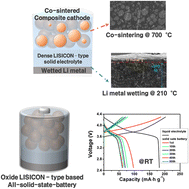Superior compatibilities of a LISICON-type oxide solid electrolyte enable high energy density all-solid-state batteries†
Abstract
Oxide solid electrolytes (SEs) are receiving a lot of attention because they are considered as a solution for the chemical/thermal instability of conventional liquid electrolytes. However, the use of oxide SEs in a cell has several challenging issues including the reactivity of the electrode materials. Here, we report the fascinating properties of a LISICON-type solid electrolyte (SE) (Li3.5Si0.5P0.5O4 – LSPO) that does not react with high-capacity electrode materials and has good wetting properties with Li metal. LSPO with Ni-rich layered materials has superior chemical stability, which may be partly a result of a relatively low sintering temperature of 700 °C compared to other oxide SEs. The heat-treatment at 700 °C does not induce any chemical reaction but achieves improved and uniform interfacial contact of active particles with SE particles due to selective sintering of SE particles. Furthermore, the LSPO SE does not react chemically with Li metal and has good wetting properties with it without any reactions even at 210 °C, so interfacial resistance with Li metal is substantially reduced. Because of these superior compatibilities, a LISICON-type all-solid-state battery (ASSB) can be easily constructed using a co-sintering process with Li(NixMnyCoz)O2 and Li metal. A high-energy-density ASSB that uses the LISICON-type SE has good electrochemical activity and reversibility for 50 cycles at room temperature. The findings and insights presented here provide new possibilities for practical use of LISICON-type oxide SEs in high-energy-density ASSBs.



 Please wait while we load your content...
Please wait while we load your content...